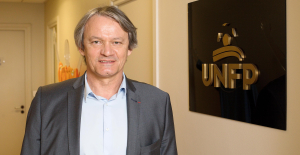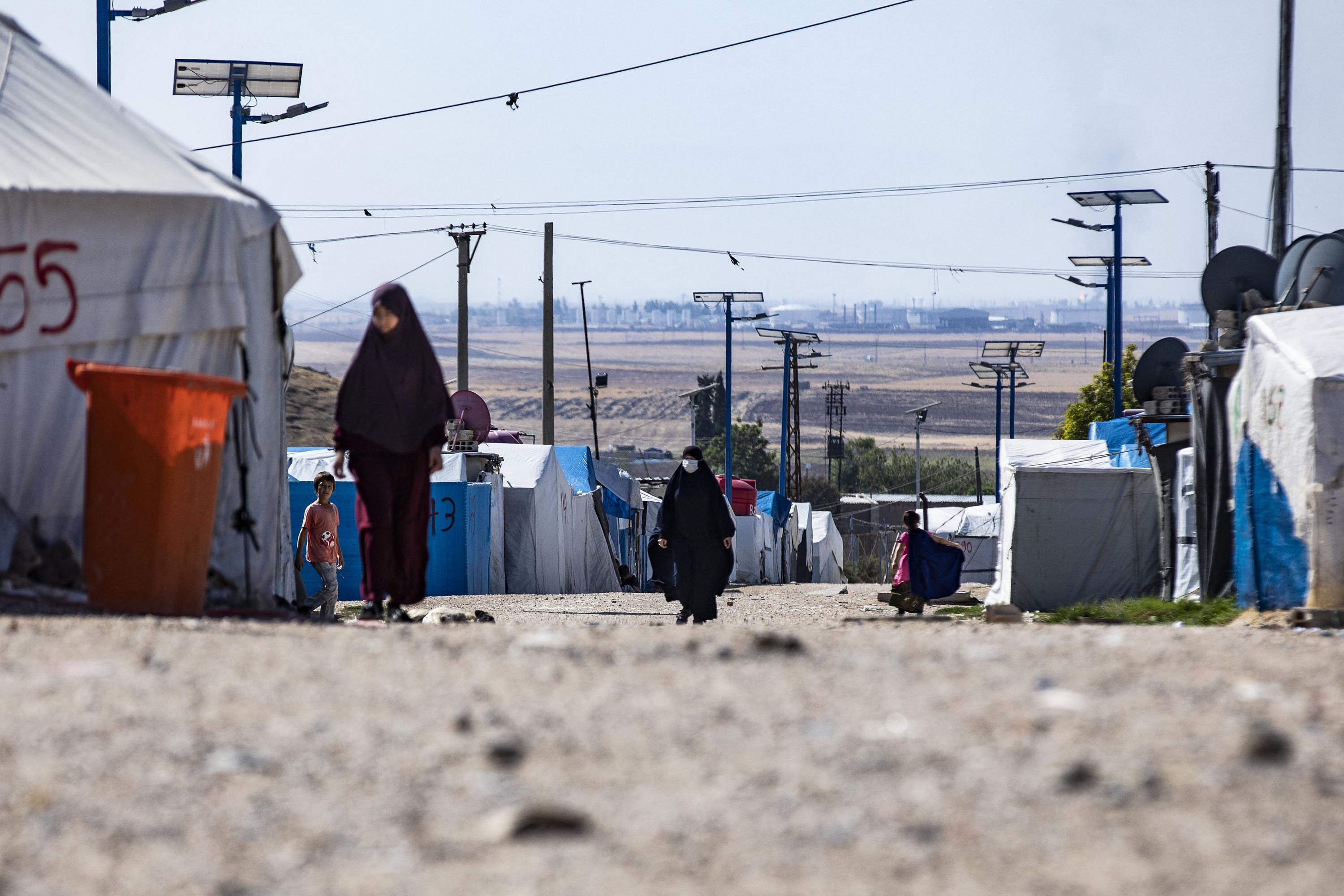“I felt they were really happy to be able to meet us.” After nine years of waiting, Suzanne was finally able to see her grandchildren held in the Roj jihadist prison camp in Syria. “The little one, who was born in the camp, immediately sat on my lap and showered me with cuddles. We talked and talked, we had so much to say to each other over all these years,” she told France Info. Accompanied by two hired lawyers, Suzanne and another family representative traveled to Syria at the end of February. This is the first time that French families have met children and mothers who had voluntarily joined Daesh. The latter are now locked up in camps in the northeast of the country, under Kurdish authority.
Suzanne's son and daughter-in-law left France to join Daesh in 2015. She was therefore unable to meet her grandchildren born in Syria. Since the defeat of the terrorist group in 2019, the siblings have lived in a tent, with other jihadist children and mothers. The latter also asked “a lot of questions” during the visit of Suzanne and the two French lawyers, tells Le Figaro Me Marie Dosé, criminal lawyer who traveled to Syria with Me Matthieu Bagard, co-president of Avocats without limits.
“These mothers are known for not wanting to return to France, so I thought they would show distrust or aggression. But they asked us what the procedure to follow was, the prison sentences, the fate of the children...,” says Me Dosé, who nevertheless recognizes that some mothers “refused” to speak to them.
The criminal lawyer had already traveled to Syria “three or four times” with the NGO Avocats sans frontières and this time with the Collective of United Families – which fights for the repatriation of families imprisoned in Syria, but without ever succeeding in reach the camps. In total, according to Me Marie Dosé, around a hundred children, around forty mothers and around 70 French men are still held in Syrian camps. When contacted, the Ministry of Foreign Affairs has not yet responded to our requests to confirm this figure.
For the collective, this trip was also a way to call on France once again to take action to repatriate these children. “How can the authorities of a rule of law abandon young French people, who left as children in Syria, in such a state when they had and still have the capacity to repatriate them? It is deeply shocking,” the collective wrote in a press release. On site, “these children live in difficult conditions where Turkish bombings are more and more frequent and violent. They no longer have electricity, no healthcare and no school,” laments Me Marie Dosé.
“It was heartbreaking to leave them, I will always remember, when we were in the car, we said goodbye to them and they were all watching us leave and we left them there, behind this barbed wire,” Suzanne described to France Info. “These children have suffered enough (...) we must bring them back quickly. They deserve to live the life of a child,” she continued.
And according to Me Marie Dosé “there are several solutions” to repatriate these children. Among them, “these mothers, who are the subject of an international arrest warrant, must be taken to a sovereign state in which expulsion procedures to France could be initiated,” she explains. . Because the northeast of Syria where they are located, under Kurdish control, is not a recognized state. Extraditions are therefore not possible there. According to Me Dosé, only France could achieve this because “the Kurdish authorities do not have the means and cannot force women to leave the camps”.
The last repatriation operation of jihadist families carried out by France dates back to July 2023. Ten women aged 23 to 40 and twenty-five children were then repatriated. These French women had voluntarily gone to territories controlled by jihadist groups in the Iraqi-Syrian zone and then were captured at the time of the fall of Daesh in 2019. This operation was the fourth of its kind, the previous one dated from January 2023 and had allowed the repatriation of 15 women and 32 children. Until the summer of 2022, France favored the gradual repatriation of its citizens held in the camps, out of fear, in particular, of possible terrorist acts on its soil.

 Russia: schools will train children to use drones at the start of the school year
Russia: schools will train children to use drones at the start of the school year Austria: incestuous torturer Josef Fritzl, nicknamed the “national monster”, could soon be released
Austria: incestuous torturer Josef Fritzl, nicknamed the “national monster”, could soon be released An airline continues to treat a centenarian as a one-year-old baby
An airline continues to treat a centenarian as a one-year-old baby Germany: the trial of nine “Citizens of the Reich” conspirators begins this Monday
Germany: the trial of nine “Citizens of the Reich” conspirators begins this Monday Sánchez cancels his agenda and considers resigning: "I need to stop and reflect"
Sánchez cancels his agenda and considers resigning: "I need to stop and reflect" The Federal Committee of the PSOE interrupts the event to take to the streets with the militants
The Federal Committee of the PSOE interrupts the event to take to the streets with the militants Repsol: "We want to lead generative AI to guarantee its benefits and avoid risks"
Repsol: "We want to lead generative AI to guarantee its benefits and avoid risks" Osteoarthritis: an innovation to improve its management
Osteoarthritis: an innovation to improve its management Sanofi: demonstration in front of Paris headquarters against job cuts
Sanofi: demonstration in front of Paris headquarters against job cuts The Chinese car manufacturer BYD sets out to conquer France
The Chinese car manufacturer BYD sets out to conquer France Public finances: after the deputies, Bruno Le Maire asks the senators for savings avenues
Public finances: after the deputies, Bruno Le Maire asks the senators for savings avenues Faced with opposition from London, a fund supported by Abu Dhabi abandons the purchase of the Daily Telegraph
Faced with opposition from London, a fund supported by Abu Dhabi abandons the purchase of the Daily Telegraph Omar Sy on all cultural fronts
Omar Sy on all cultural fronts Jacques Audiard, Swann Arlaud, Benjamin Stora... A hundred men from cinema, theater and books in support of
Jacques Audiard, Swann Arlaud, Benjamin Stora... A hundred men from cinema, theater and books in support of Resale, scams and fake tickets: how not to get scammed before Taylor Swift concerts
Resale, scams and fake tickets: how not to get scammed before Taylor Swift concerts Isild Le Besco is not ready to file a complaint against Benoît Jacquot
Isild Le Besco is not ready to file a complaint against Benoît Jacquot Omoda 7, another Chinese car that could be manufactured in Spain
Omoda 7, another Chinese car that could be manufactured in Spain BYD chooses CA Auto Bank as financial partner in Spain
BYD chooses CA Auto Bank as financial partner in Spain Tesla and Baidu sign key agreement to boost development of autonomous driving
Tesla and Baidu sign key agreement to boost development of autonomous driving Skoda Kodiaq 2024: a 'beast' plug-in hybrid SUV
Skoda Kodiaq 2024: a 'beast' plug-in hybrid SUV The home mortgage firm rises 3.8% in February and the average interest moderates to 3.33%
The home mortgage firm rises 3.8% in February and the average interest moderates to 3.33% This is how housing prices have changed in Spain in the last decade
This is how housing prices have changed in Spain in the last decade The home mortgage firm drops 10% in January and interest soars to 3.46%
The home mortgage firm drops 10% in January and interest soars to 3.46% The jewel of the Rocío de Nagüeles urbanization: a dream villa in Marbella
The jewel of the Rocío de Nagüeles urbanization: a dream villa in Marbella Europeans: a senior official on the National Rally list
Europeans: a senior official on the National Rally list Blockade of Sciences Po: the right denounces a “drift”, the government charges the rebels
Blockade of Sciences Po: the right denounces a “drift”, the government charges the rebels Even on a mission for NATO, the Charles-de-Gaulle remains under French control, Lecornu responds to Mélenchon
Even on a mission for NATO, the Charles-de-Gaulle remains under French control, Lecornu responds to Mélenchon “Deadly Europe”, “economic decline”, immigration… What to remember from Emmanuel Macron’s speech at the Sorbonne
“Deadly Europe”, “economic decline”, immigration… What to remember from Emmanuel Macron’s speech at the Sorbonne These French cities that will boycott the World Cup in Qatar
These French cities that will boycott the World Cup in Qatar Bayern Munich-Real Madrid: in video, all the goals from the C1 clash
Bayern Munich-Real Madrid: in video, all the goals from the C1 clash Ligue 1: Zaire-Emery, Yoro, Roy, Griezmann... The others nominated for the UNFP Trophies
Ligue 1: Zaire-Emery, Yoro, Roy, Griezmann... The others nominated for the UNFP Trophies Bayern Munich-Real Madrid: in video, the magnificent tifo in tribute to Franz Beckenbauer
Bayern Munich-Real Madrid: in video, the magnificent tifo in tribute to Franz Beckenbauer Ayrton Senna: 30 anecdotes that you (perhaps) don't know about the Brazilian who died thirty years ago
Ayrton Senna: 30 anecdotes that you (perhaps) don't know about the Brazilian who died thirty years ago
















